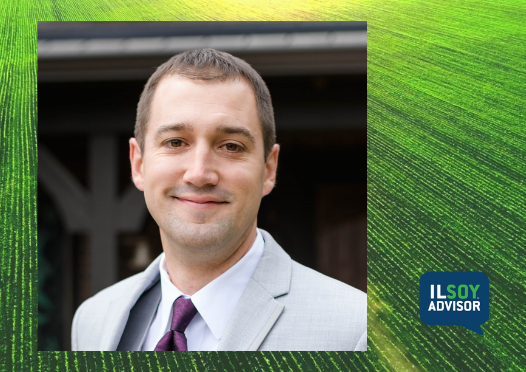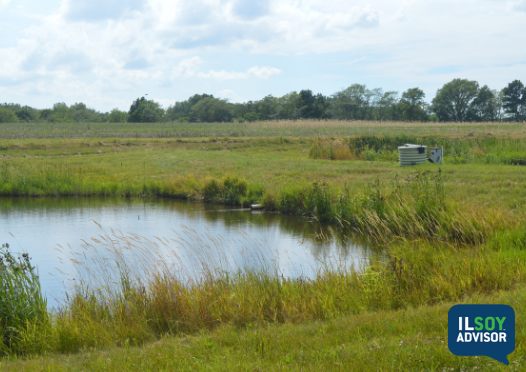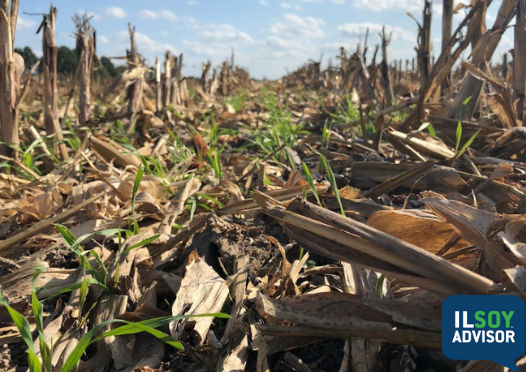ILSOYADVISOR POST
SHOWCASE FARMER: Kevin Marshall
The farmer. Kevin Marshall is the fifth generation to run the Marshall family farm—1,400 acres in DeKalb, Kane and LaSalle counties--where he grows corn, soybeans and wheat.
In addition to his day-to-day farming operation, Marshall and his wife, Colleen, own and operate a crop dusting operation, AgriFlite West. “I have my feet in both the farmer and applicator side of cover crops,” he explains, “and I take deliberate steps in both operations to become more sustainable.”
Marshall’s commitment to sustainability comes from a long family history of prioritizing the quality of the land and the soil. “Sustainability is something that I grew up with,” he says. “It’s as integral to my practice as it was to my father’s practice before me.”
Environmental challenge. The Marshall farm is close to the Big Rock Creek Watershed and is about 10 miles away from the Fox River Valley. “That kind of proximity means I need to be careful about what happens on my farm because it can ultimately impact areas as far as the water travels.”
Best Management Practices. Marshall has been experimenting with cover crops for three years, ranging from cereal rye to annual ryegrass, triticale and rapeseed, and he uses a combination of mulch-till, strip-till and zero-till on his operation. He also is involved with N-Watch, a management tool designed to measure and track nitrogen levels in the soil to help growers make application decisions. To support the program, he provides soil samples to the Great Lakes Laboratory through a program of the Illinois Council on Best Management Practices (CBMP). The program has helped him grow his knowledge of sustainability.
While Marshall tried sustainable practices primarily to improve his land, he hopes to see an impact on his bottom line as well, adding that he is still in the testing process with cover crops. “My biggest motivation on the farm is lowering my input costs,” he says. “I’ve found that conservation practices actually help me get there by improving my soil.”
Sustainable focus for 2015. Marshall plans to use cover crops more extensively behind his wheat crop and will continue nitrate testing with N-Watch. His interest in water quality is growing in light of the Illinois Nutrient Loss Reduction Strategy and he has been looking into installing a bioreactor, a project he is pursuing based on his personal interest in improving the sustainability of his operation. “It’s new and there isn’t a lot of information out there yet,” he says. “But it’s exciting to look into something new that has the potential to make a big difference on my farm.”
A large part of Marshall’s interest in sustainability is his curiosity and the challenge of continually improving his practice. “I love to set an ambitious goal and investigate the steps I need to reach it,” he says. This curiosity has led to prioritizing on-farm research to test different management programs to see what he wants to implement on his fields. He adds that his background as a test engineer for Case New Holland helped prepare him for the R&D process. “Whether you’re working with pests or cover crops, you need to invest time, money and research into finding the best practices. It’s not easy, but it’s worth it.”
Sustainable start. His advice to farmers looking to improve the sustainability of their operations is to be patient and not try to take on too much at once. He sees many farmers giving up on cover crops because they don’t see a quick return. “I’ve learned that cover crops are a long-term investment and you need to give them time.” He adds that it’s important to try one practice at a time. “You can’t try no-till and cover crops and split applications all in the same year. Figure out which piece of the puzzle you want to try and focus your energy on making it a success.”
Marshall’s sustainable practices don’t stop on his farm. Through AgriFlite West, an aerial application business, he works with local beekeepers to coordinate his crop dusting schedule so that they can lock up their bees to avoid any chemical contact. “I do everything I can to be more sustainable on my own farm, and I try to bring that to AgriFlite as well. The less impact I have on the environment, the insects around me and the water close by and downstream, the better.”





Comments
Add new comment